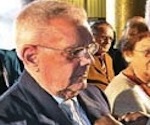11.9.2 Manuel Duchesne Cuzán.

Manuel Duchesne Cuzán, Cuban orchestra conductor, was born in Havana on November 10, 1932. He completed his higher education at the Municipal Conservatory of Havana with José Ardévol, Harold Gramatges, and Edgardo Martín. He also studied conducting with the prestigious maestro Enrique González Mantici and completed his studies with the renowned Igor Markevich.
In 1954, he began his conducting career with the Alicia Alonso Ballet Orchestra, completing his first tours of Argentina, Chile, and Uruguay with this company. He also served as guest conductor with the Havana Philharmonic and CMQ Radio Symphony Orchestras. Five years later, he took over as director of the National Theater of Cuba Orchestra (Paseo and 39th Street, Vedado, Plaza de la Revolución, Havana) (OTNC) and the National Modern Dance Ensemble (CNDM).
Manuel Duchesne Cuzán represented a decisive impulse for the renewal of the expressive language of contemporary composers and was a stimulus for new generations of musicians, beginning with his association with composers Juan Blanco, Leo Brouwer, and the late Carlos Fariñas. He thus initiated the aesthetic movement known as the Vanguardia in 1964, an action that brought Cuban musical work up to date with new compositional trends and the most advanced aesthetic currents on the international scene.
At the founding of the Cuban National Symphony Orchestra (OSNC), he served as Assistant Conductor and was promoted to Principal Conductor in 1963. During these years, he began teaching conducting classes at the Alejandro García Caturla Conservatory in Havana (31st Avenue and 82nd Street, Marianao, Havana).
His promotional work helped transform the Cuban public’s taste and interest in new avant-garde musical trends, disseminating a succession of works essential to understanding contemporary musical art.
Manuel Duchesne began his work in opera music in 1968, when he was appointed director of the National Ballet and Opera Theater of Cuba, where he promoted and musically directed the premiere of several productions over several seasons.
He was the director of the irreplaceable Instrumental Ensemble “Nuestro Tiempo” expressly dedicated to disseminating the most contemporary national and international repertoire of the 20th century.
He directed the Music Department of the Cuban Institute of Cinematographic Arts and Industry (ICAIC) (1155 Calle 23 between 10th and 12th, Vedado, Plaza de la Revolución, Havana) throughout the 1980s and early 1990s, a period in which he recorded most of the soundtracks for Cuban cinema, conducting the Cuban National Symphony Orchestra and the “Nuestro Tiempo” Instrumental Ensemble. He has composed over 400 titles, including short and feature films. There are few Cuban film productions in which his name does not appear on screen.
He was simultaneously a guest conductor of several symphony orchestras in different countries, participating in numerous contemporary music festivals and competitions where he served as a jury member. He conducted symphonic concerts in Latin American countries such as Chile, Argentina, Venezuela, Peru, Brazil, Mexico, and Ecuador, and in European countries such as the former Soviet Union, Czechoslovakia, Poland, Hungary, China, Korea, Romania, Germany, and Bulgaria.
His appointment as director of the Centro Pro-Arte Lírico (Pro-Arte Lyric Center) led to new premieres and revivals of the operatic repertoire, and he organized a series of international tours to contribute to the knowledge of the Cuban lyrical repertoire and its most outstanding singers.
He also served as Head of the Symphonic Music Department of the Music Directorate of the Ministry of Culture (2nd Street between 11th and 13th, Vedado, Plaza de la Revolución, Havana) and as Head of the Orchestra Conducting Department of the Higher Institute of Art (ISA) (1110 120th Street between 9th and 13th, Cubanacán, Playa, Havana).
Manuel Dúchense passed away on September 9, 2010. During his artistic career, he received important awards and distinctions, both in Cuba and abroad. His constant and dedicated work as a conductor leading the most prestigious Cuban orchestral groups and his extensive contributions to the knowledge of contemporary music have made history, which has been repeatedly recognized by the national and international press. These virtues grant him the privilege of placing him among the leading Cuban musical conductors and promoters of the 20th century.








